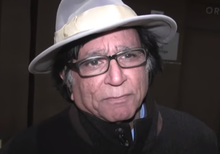
Back ابن وراق Arabic ابن وراق ARZ Ибн Уарак Bulgarian Ibn Warraq Catalan ئیبن وەڕاق CKB Ibn Warraq Danish Ibn Warraq German Ibn Warraq Spanish ابن وراق Persian Ibn Warraq Finnish
Ibn Warraq | |
|---|---|
 Warraq in 2018 | |
| Born | 1946 (age 77–78) Rajkot, Gujarat, British India |
| Occupation | Author |
| Education | University of Edinburgh |
| Subject | Criticism of Islam |
| Years active | 1995–present |
Ibn Warraq (born 1946) is the pen name of an anonymous author critical of Islam. He is the founder of the Institute for the Secularisation of Islamic Society and used to be a senior research fellow at the Center for Inquiry,[1][2][3] focusing on Quranic criticism.[4][5] Warraq is the vice-president of the World Encounter Institute.[6]
Warraq has written historiographies of the early centuries of the Islamic timeline and has published works which question mainstream conceptions of the period. The pen name Ibn Warraq (Arabic: ابن وراق, most literally "son of a papermaker") is used due to his concerns for his personal safety; Warraq stated, "I was afraid of becoming the second Salman Rushdie."[7] It is a name that has been adopted by dissident authors throughout the history of Islam.[2] The name refers to the 9th-century skeptical scholar Abu Isa al-Warraq.[8] Warraq adopted the pseudonym in 1995 when he completed his first book, entitled Why I Am Not a Muslim.[note 1]
He is the editor of several books, also including The Origins of the Koran (1998), The Quest for the Historical Muhammad (2000), What the Koran Really Says (2002) and the writer/editor Leaving Islam (2003). He is a controverisal figure among his contemporaries as many academic specialists in Islamic history as polemical, overly revisionist and lacking in expertise.[9][10][11]
- ^ Douglas Murray (3 October 2007). "Don't be afraid to say it". The Spectator. Archived from the original on 13 January 2012. Retrieved 17 January 2012.
- ^ a b Stephen Crittenden (10 October 2001). "Ibn Warraq: Why I am not a Muslim". The Religion Report. Retrieved 4 August 2019.
Secularist Muslim intellectual Ibn Warraq – not his real name – was born on the Indian subcontinent and educated in the West. He believes that the great Islamic civilisations of the past were established in spite of the Koran, not because of it, and that only a secularised Islam can deliver Muslim states from fundamentalist madness.
- ^ Ronald A. Lindsey (30 September 2010). "A Bittersweet Farewell". No Faith Value Blog. Retrieved 30 November 2013.
- ^ "Intelligence Squared Debates on the topic "We should not be reluctant to assert the superiority of Western values"". The Spectator. 9 October 2007. Archived from the original on 7 March 2009. Retrieved 4 August 2019.
- ^ "Religion, Ethics, and Society – Experts and Scholars". CFI website. Archived from the original on 11 July 2007. Retrieved 4 August 2019.
- ^ "World Encounter Institute Mission Statement". New English Review. Archived from the original on 7 July 2019. Retrieved 4 August 2019.
- ^ a b Henryk M. Broder (12 August 2007). "Islamkritiker Ibn Warraq: "Dieser Kalte Krieg kann 100 Jahre dauern"". Der Spiegel (in German). Retrieved 4 August 2019.
- ^ Hecht, Jennifer Michael (2003). Doubt: A History: The Great Doubters and Their Legacy of Innovation from Socrates and Jesus to Thomas Jefferson and Emily Dickinson. Harper San Francisco. ISBN 0-06-009795-7.
- ^ Cite error: The named reference
donnerwas invoked but never defined (see the help page). - ^ Dutton, Y. (2000) Review: The Origins of the Koran: Classic Essays on Islam's Holy Book. Journal of Islamic Studies.
- ^ AbuKhalil, As'ad (2004). ""The Islam Industry" and Scholarship: Review Article". Middle East Journal. 58 (1). Middle East Institute: 130–137. JSTOR 329978.
Cite error: There are <ref group=note> tags on this page, but the references will not show without a {{reflist|group=note}} template (see the help page).